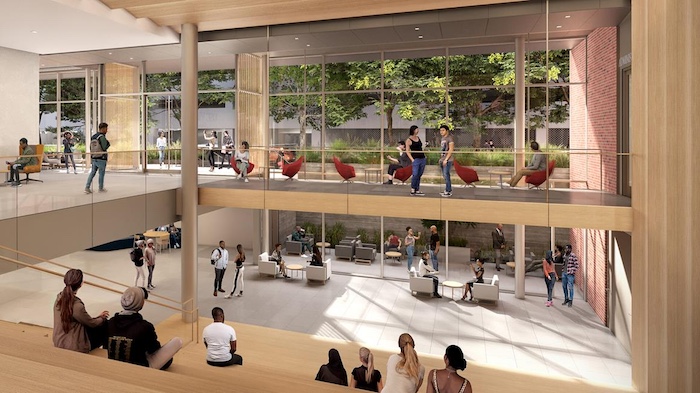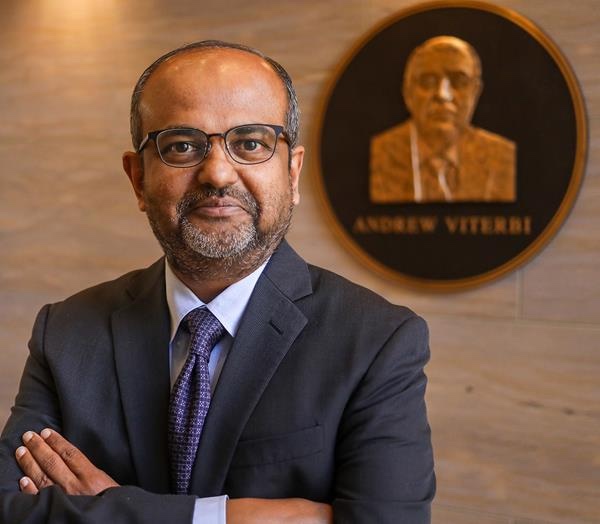
LOS ANGELES- USC President Carol Folt has launched the university’s first new school in more than a decade: the USC School of Advanced Computing, a cornerstone of her $1 billion advanced computing initiative.
The school seeks to educate all students, regardless of their major, in the ethical use of computing technology as part of the president’s Frontiers of Computinginitiative.
Folt has appointed Gaurav Sukhatme — a professor of computer science and electrical and computer engineering, and executive vice dean of the USC Viterbi School of Engineering — as the school’s inaugural director.

“Gaurav is a visionary with exceptional talent whose work is on the cutting edge of the explosive growth in technology and computing,” Folt said. “He is the ideal choice to lead this new, innovative school.”
Rooted in an interdisciplinary approach, the School of Advanced Computing, a unit of USC Viterbi, will serve as the hub for advanced computing research and education at USC. Here, engineers, scientists and professionals — from disciplines spanning the arts and humanities, business, health, sustainability and other areas — will harness the power of advanced computing to tackle society’s most pressing issues, from climate change to public health, with ethics at the core.
The school is the keystone of the president’s USC Frontiers of Computing “moonshot,” a more than $1 billion initiative that supports ethical advancement in areas such as artificial intelligence, robotics and quantum computing. The initiative was envisioned by Folt, who jumpstarted the effort with a university gift of $260 million from the Lord Foundation of California.
In a letter announcing Sukhatme’s appointment, Folt said the initiative allows the Lord gift to have “a long-lasting impact and to be game-changing for our students and faculty.”
USC is rising as a prominent, competitive institution for world-class scientists and engineers; the development and innovation of drug therapies, devices and technologies; and the recruitment of students — a moonshot dubbed “USC Competes.”
The ranks of faculty at the new School of Advanced Computing are expanding. Thirty new faculty members will be appointed in priority areas by 2025; another 60 will have been recruited by 2030. While enhancing the educational and research opportunities attractive to undergraduate and graduate students, the addition of faculty will expand USC’s portfolio of intellectual property and widen its network of collaborators across academia and industry.
Under Frontiers of Computing, the university aims to provide all students with knowledge of advanced computing that informs their areas of study, regardless of discipline, with a high awareness of the benefits and implications of technology and ethical development.
“Because of our long history of achievement in computing at USC, our world-class scientists who are experts, entrepreneurs and inventors have a unique opportunity to give our students in all disciplines the awareness, knowledge and skills in computing that will change the world as we know it,” said Provost Andrew T. Guzman.
The university’s 23rd school is launching at an auspicious time in the history of computer science and computer engineering, said Yannis C. Yortsos, dean of USC Viterbi.
“The extraordinary advances in computing in recent years are revolutionizing our understanding and exploration of new phenomena, from the physical and chemical realms to the biological and social domains, paving the way for innovative solutions to grand challenge-like problems,” said Yortsos.
The school’s academic offerings will include world-leading education programs in advanced computing for students and professionals across all disciplines and educational backgrounds. Additional programs, including graduate education programs in data science, will equip professionals from diverse fields, ranging from health care to finance, to make informed, ethical data decisions.
“In this pivotal moment, the School of Advanced Computing signals USC’s mission to provide a digital backbone for education across the university and to pursue advanced research in all aspects of computing,” Sukhatme said. “From the design of new paradigms for artificial intelligence and machine learning to explorations in science, medicine, business, policy, law, the humanities and the arts — it is a tremendous honor and privilege to lead this initiative.”
Read more about the USC School of Advanced Computing, the “school-within-a-school” under USC Viterbi.
Sukhatme, a world-renowned expert
Sukhatme’s ties to USC are deeply rooted, extending back to his early days as a graduate student at the university. Sukhatme joined USC as a graduate student in 1991, received his PhD in computer science in 1997 and became a tenure-track professor in 2000.
A seasoned senior administrator, he brings a wealth of experience from previous leadership roles at the university, serving as the executive vice dean of USC Viterbi since 2017.
Between 2012 and 2017, he served as chair of the USC Department of Computer Science during one of its most rapid phases of expansion, which included the hiring of 20 new faculty, the launch of a new data science program and the restructuring of undergraduate and graduate programs.
Sukhatme is an internationally recognized expert in networked robotic systems, with a focus on environmental monitoring. He is a fellow of the Association for the Advancement of Artificial Intelligence and the Institute of Electrical and Electronics Engineers, and an Amazon Scholar.
In September, he was installed as the USC Donald M. Alstadt Chair of Advanced Computing at the naming ceremony of the Thomas Lord Department of Computer Science.
Learn more about Gaurav Sukhatme, inaugural director of USC School of Advanced Computing in this Q&A
About USC Frontiers of Computing
Frontiers of Computing intersects with other presidential moonshots such as health affairs, which encompasses health, economics and policy sciences, and biomedical research. The sustainability moonshot comprises the university’s efforts to reduce its carbon footprint and invigorate research across biological, chemical, earth, environmental and medical sciences; business and engineering innovation; and policy. Read more online.



















